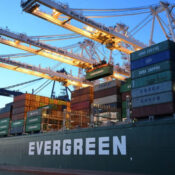
Green Logistics And Renewable Transportation: Building Sustainable Supply Chains
In the era of increasing environmental consciousness, businesses worldwide are recognizing the need to incorporate sustainability into their operations. One area that has gained significant attention is logistics, where the concept of green logistics is transforming the way goods are transported, stored, and distributed.
With a focus on minimizing environmental impact, green logistics encompasses various strategies, including the adoption of renewable energy sources, optimizing transportation routes, and embracing innovative technologies. In this article, we delve into the realm of green logistics, exploring its principles, benefits, and the crucial role it plays in building a sustainable future for supply chains.
Green logistics, also known as sustainable logistics or eco-logistics, refers to the integration of environment-friendly practices into logistics operations. It seeks to minimize carbon emissions, reduce waste generation, and conserve natural resources throughout the entire supply chain process. Green logistics encompasses a broad range of strategies, such as energy-efficient transportation, eco-friendly packaging, waste reduction, and reverse logistics, among others. By incorporating these practices, companies aim to achieve a balance between economic growth and environmental stewardship.
One key aspect of green logistics is the utilization of renewable energy sources to power transportation and distribution activities. Traditional logistics heavily rely on fossil fuels, which contribute significantly to greenhouse gas emissions.

Renewable logistics, on the other hand, leverages renewable energy technologies such as solar power, wind energy, and biofuels to minimize carbon footprints and reduce reliance on non-renewable resources. Electric Vehicles (EVs) and hybrid trucks are gaining popularity as viable alternatives to traditional gasoline and diesel-powered vehicles, as they offer lower emissions and reduced operating costs. Moreover, the installation of solar panels on warehouses and distribution centers allows for on-site renewable energy generation, further reducing carbon emissions associated with electricity consumption.
Implementing green and renewable logistics practices brings forth numerous benefits for businesses, the environment, and society as a whole. First, it enables companies to meet regulatory requirements and comply with sustainability standards, enhancing their corporate image and reputation. Consumers are increasingly favoring eco-conscious brands, leading to improved customer loyaltyand increased market share. Secondly, green logistics strategies often result in cost savings through energy efficiency measures, reduced fuel consumption, and optimized transportation routes. These savings can be reinvested into further sustainable initiatives or passed on to customers, providing a competitive edge.
Additionally, green logistics plays a vital role in mitigating climate change by reducing greenhouse gas emissions, preserving ecosystems, and promoting resource conservation.
Adopting green logistics practices requires a holistic approach and collaboration throughout the supply chain. Here are some key steps companies can take to embark on the path towards sustainability:
- Conduct a comprehensive environmental impact assessment of logistics operations to identify areas for improvement.
- Optimize transportation routes to minimize mileage, reduce fuel consumption, and decrease carbon emissions.
- Invest in fleet modernization, transitioning to electric or hybrid vehicles, and explore alternative fuel options such as biofuels.
- Embrace advanced technologies like GPS tracking, real-time data analytics, and warehouse automation to improve efficiency and reduce waste.
- Implement reverse logistics processes to minimize product returns, facilitate recycling, and promote circular economy principles.
- Collaborate with suppliers and partners to promote sustainable practices throughout the entire supply chain.
As businesses face growing pressure to address environmental concerns, green
logistics and renewable logistics offer a compelling solution to build more
sustainable supply chains. By integrating eco-friendly practices and renewable
energy sources, companies can reduce their environmental footprint, enhance
operational efficiency, and meet evolving consumer demands. Embracing green
logistics is not just a strategic choice; it is an essential step towards a greener,
more resilient future for both businesses and the planet.
Turkey has been making strides in sustainable energy and transport-related
projects, particularly in the logistics and transportation sector. Two types of
transportation have played a crucial role in this expansion: project transportation
and combined transportation.
Project transportation involves the efficient and secure movement of specialized
loads required for specific projects, often consisting of bulky or heavy items that
cannot be transported using standard containers. This method utilizes various
transportation modes, including road, sea, rail, or air, to transport the specialized
materials. On the other hand, combined transportation refers to using at least two
different transportation types, such as road, sea, rail, and air, to deliver cargo to its
destination. This approach proves beneficial for swiftly and effectively moving
various types of goods.
The implementation of "Proje and Kombine Taşımacılık" (Project and Combined
Transportation) not only provides economic advantages but also contributes to the
ecological balance. By incorporating sea and rail transportation alongside road
transport, this approach helps decrease CO2 emissions, thus contributing to
climate change mitigation.
Project transportation primarily serves the transportation needs of heavy industrial materials required for infrastructure, energy, and construction projects. As Turkey invests more in renewable energy projects, there has been a noticeable increase in project transportation for renewable energy equipment. To further enhance this sector, the article emphasizes the importance of raising awareness and implementing regulations for project transportation.
Additionally, it calls for expanding railway connections to ports and developing alternative transportation options to meet the growing demands in the industry. Given the country expanding economy and increasing investments in various sectors, the article predicts significant market share growth for project and combined transportation in Turkey in the coming years. This growth, coupled with a focus on sustainability, is expected to pave the way for a more environmentally conscious and efficient transportation landscape in the country.




